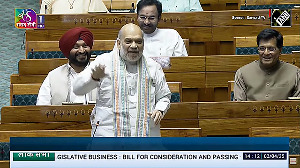A raft of populist social sector policies aimed at the common man has been cleared by the Union Cabinet and the Cabinet Committee on Economic Affairs over the last four weeks.
An analysis of all the decisions taken shows that more social sector schemes have been cleared between August 14 (when the Left parties first threatened to pull the rug from under the government's feet over the Indo-US Civil Nuclear Agreement) and September 16 than in the four months preceding the period.
Prime Minister Manmohan Singh had acknowledged on May 22 that just two years were left for the UPA government to complete its agenda on social inclusion. Presenting the United Progressive Alliance government's report to the people, the Prime Minister had said: "In the next two years, we will focus on ensuring that important flagship programmes we have launched are properly implemented."
However, a sense of urgency is palpable in the proceedings of the Union Cabinet and CCEA since August 14, when the Left warned the government against going ahead with negotiations on the nuke deal.
While the government took 15 aam aadmi decisions in a dozen meetings of the Cabinet between May 3 and August 16, it has cleared an equal number of social sector initiatives in five meetings in less than a month since then to date.
The decisions include a new scholarship to fund ST students' higher education, a tribal university named after Indira Gandhi, hiking the retirement age of employees in profitable PSU, an aam aadmi insurance scheme for the rural landless, a health insurance scheme for unorganised workers, a social security net for them and an Ordinance to save Delhi from massive demolitions of unauthorised construction.
Recent CCEA clearances, which provide a glimpse into economic decision, also include more and more social sector schemes.
Of the 21 decisions taken in nine meetings of the CCEA from May 17 (the first time it met that month) to the August 16 meeting, only eight can be called as aam aadmi decisions. These included a centrally sponsored skill development initiative and a merit-cum-means scholarship scheme for Muslim and other minority students.
In contrast, in four meetings over the last one month, as many as 14 decisions were taken, of which nine are aimed at the common man. Interestingly, seven of these are continuations of ongoing programmes such as a nutrition scheme for adolescent girls, the rural employment generation programme and the livestock insurance scheme.
This is apart from what the Cabinet Committee on Prices (whose decisions are not made public) has been doing to combat the price rise.
It has been clear that the UPA swears by the aam aadmi. But, the common man became serious electoral strategy when, in August, an internal assessment paper, that is likely to become the basis for election propaganda, found the UPA far ahead of the NDA on issues related to the masses. Prepared in the Planning Commission, the paper asserts that the UPA government has succeeded in substantial reduction in poverty levels.
It is evident that the Cabinet and CCEA are taking decisions which would impact the national electoral mood. At a recent Planning Commission meeting on the education sector, the Prime Minister set a two-month deadline for finalising a plan to massive capacity addition -- through 6000 new schools, 30 new central universities and large vocational training institutions.








 © 2025
© 2025